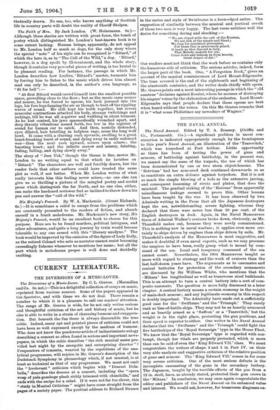THE DIVERSIONS OF A MUSIC-LOVER.
The Diversions of a Music-Lover. By C. L. Graves (Macmillan and Co. 6s. net.)—This is a delightful collection of essays on music, reprinted from various sources. Some of the papers appeared in the Spectator, and with these we do not deal. There remain a number to which it is a pleasure to call our readers' attention. The range of Mr. Graves is wide, for he not only writes serious and thoughtful criticism of the art and history of music, but he also is able to write in a strain of charming humour and exaggera- tion. But beneath the fun there is always discernible the true critic. Indeed, many apt and pointed pieces of criticism could not have been so well expressed except by the medium of humour. Who does not know the ponderous article of indiscriminate eulogy describing a concert so often found in serious and important news- papers, in which the critic describes "the rich musical menu pro- vided last night by the energetic and enterprising director"? Frequenters of concerts, wearied by the repetitions of the ana- lytical programme, will rejoice in Mr. Graves's description of the Dudelsack Symphony in phraseology which, if not musical, is at least as technical as that of any programme. We must not omit the " Irrelevant " criticism which begins with "Dearest Dola- bells," describes the dresses at a concert, including the "opera wrap of pale gamboge plush richly trimmed with chinchilla," and ends with the recipe for a salad. If it were not far too clever, this "study in Musical Criticism" might have come straight from the pages of a society paper. The poetical address to Richard Strauss We are cloyed with the cult of the Russian,
We are sick of the simple and bland ; We long for persistent percussion, For brass that is gruesomely grand.
0 teach Us that discord Is duty,
That Melody maketh for sin.
Come down and redeem UB from beauty,
Great despot of din I"
Our readers must not think that the work before us contains only the humorous side of criticism. The serious articles, indeed, form the larger part of the book. One, "A Forgotten Book," gives an account of the musical reminiscences of Lord Mount-Edgcumbe. The time covered is the end of the eighteenth and beginning of the nineteenth centuries, and the writer deals chiefly with opera. Mr. Graves points out a most interesting passage in which the "old amateur" declaims against Rossini, whom he accuses of destroying his singers' voices by the elaboration of the orchestra. Lord Mount- Edgcumbe says that people declare that these operas are beat when heard without the voices. On this Mr. Graves remarks that it is "what some Philistines say nowadays of Wagner."
THE NAVAL ANNUAL.


























































 Previous page
Previous page